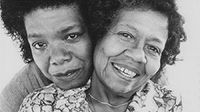"Their love informed, educated, and liberated me."
“There is always tomorrow,” wrote Maya Angelou (April 4, 1928 – May 28, 2014) when she was 80. “Today, I am blessed." Her vibrant energy, coupled with the question repeatedly asked of her—"How did you become Maya Angelou?"—prompted the last of her seven autobiographies, Mom & Me & Mom.
This book has been written to examine some of the ways love heals and helps a person climb impossible heights and rise from immeasurable depths.
When she was young, Maya Angelou and her older brother Bailey were sent to live with their paternal grandmother in Stamps, Arkansas. Their parents, separated, couldn't cope with raising the toddlers.
 Maya Angelou and Vivian Baxter.
Maya Angelou and Vivian Baxter.I was three and Bailey was five when we arrived in Stamps, Arkansas. We had identification tags on our arms and no adult supervision. I learned later that Pullman car porters and dining car waiters were known to take children off the trains in the North and put them on trains headed south.
Under the protective care of their grandmother and uncle, Maya and Bailey spent their childhood. When they were teenagers, Angelou's grandmother felt the South was too dangerous to be young and black, especially for fourteen-year-old Bailey "It was a time when if a white person walked down the one paved block in the town, any Negro on the street had to step aside and walk in the gutter." They returned to San Francisco to live with their mother, a woman they barely knew.
After a few weeks, it became clear that I was not using any title when I spoke to her. In fact, I rarely started conversations. [...]
She asked me to join her. 'Maya, I am your mother. Despite the fact that I left you for years. I am your mother. You know that, don't you?'
I said, 'Yes, ma'am.' I had been answering her briefly with a few words since my arrival in California.
'You don't have to say "ma'am" to me. You're not in Arkansas.'
'No, ma'am. I mean, no.'
'You don't want to call me "Mother," do you?'
I remained silent.
The love and support of Vivian Baxter towards her daughter jumps off the page in Mom & Me & Mom. From protecting Maya as she worked as a nightly trolley conductor to climbing on the delivery table to catch (and cradle and love) Angelou's son as he is born.
Through experience and armloads of time, the two develop and nurture the relationship nature gives them.
Whether deliberate or not the diameter of the circle that surrounds us and our mothers affects us deeply.
I walked away and was back in my bedroom before I heard my own words echoing in my mind. I had called Lady 'Mother.' I knew she had noticed, but we never ever mentioned the incident. I was aware that after the birth of my son and the decision to move and get a place for just the two of us, I thought of Vivian Baxter as my mother.
Angelou's memories of what once was are wonderfully gifted to us from the grace of age. They are luminous, well-narrated, and emotionally catching as any of Angelou's works. This book is about how Angelou came to be liberated and inspired by her mother. It is also how her mother became a mother through the need, vulnerability, and inspiration of Angelou.
I will look after you, and I will look after anybody you say needs to be looked after, anyway you say. I am here. I brought my whole self to you. I am your mother.
Stories of motherhood are long, long tales of becoming, not being. Read Mom & Me & Mom alongside Joan Didion's breathless story of the life-altering loss of a daughter or Max Porter's Grief Is a Thing with Feathers about the 'hung-empty' space left by a mother's death.
Beloved,
In what other lives or lands
Have I known your lips
Your hands
Your laughter brave
Irreverent.
Those sweet excesses that
I do adore.
What surety is there
That we will meet again
[...]
Without the Promise
Of one more sweet encounter
I will not deign to die.
From Maya Angelou's "Refusal"
 "Worker Woman with Sleeping Child" (Arbeiterfrau mit schlafendem Jungen) lithograph made by artist Käthe Kollwitz. This harrowing print is part of Kollwitz’s “Death” series, depicting the secondhand victims of WWI. Kollwitz was born in Russia in 1867 but lived and worked in Germany. Her work focused on emotional purity rather than physical reality. Learn more.
"Worker Woman with Sleeping Child" (Arbeiterfrau mit schlafendem Jungen) lithograph made by artist Käthe Kollwitz. This harrowing print is part of Kollwitz’s “Death” series, depicting the secondhand victims of WWI. Kollwitz was born in Russia in 1867 but lived and worked in Germany. Her work focused on emotional purity rather than physical reality. Learn more. The question of how we became who we are is unanswerable because the question of who we are is unanswerable. Yet parents - consistently and universally - are the first place we look for answers. Read Dani Shapiro’s remarkable narrative on how we form our most profound notions of self, Rebecca Solnit’s broken thoughts of her mother’s harmful influence, or my study of inheritance.
That Angelou gained intelligence, liberation, and empowerment from these remarkable women - and gave much to us in return - is without question. 


